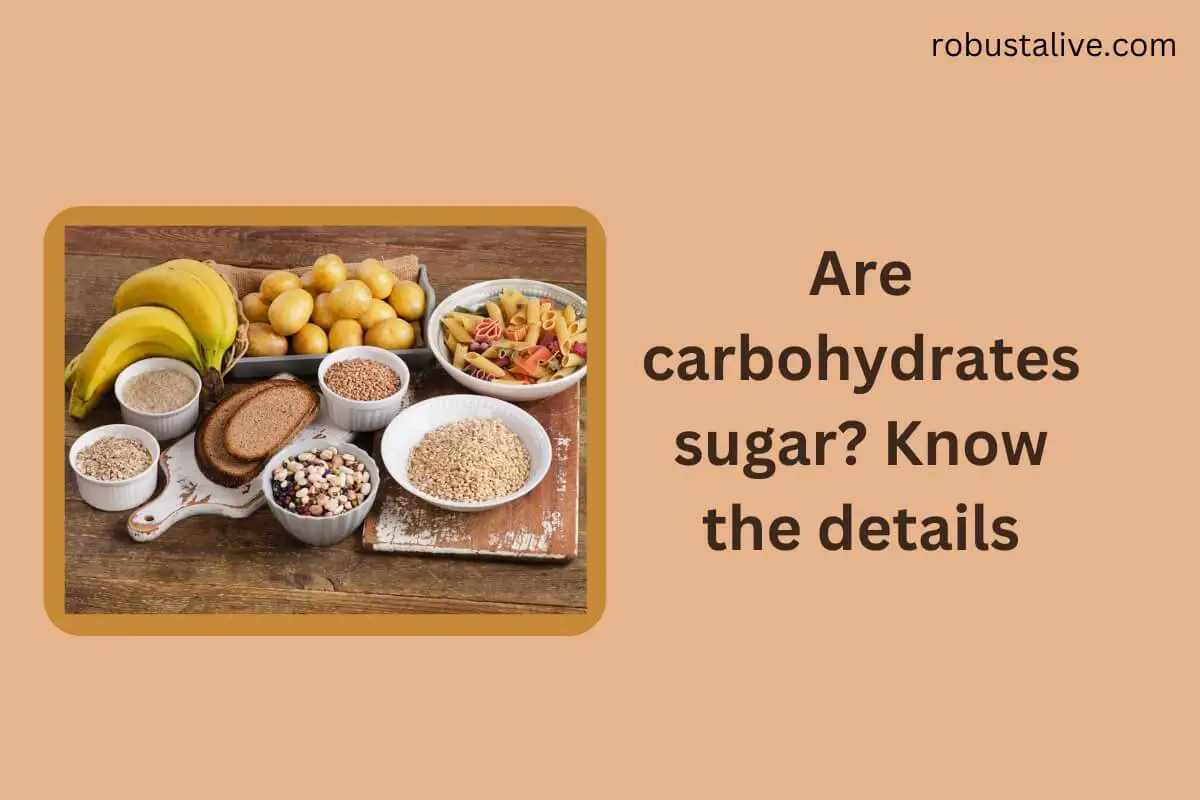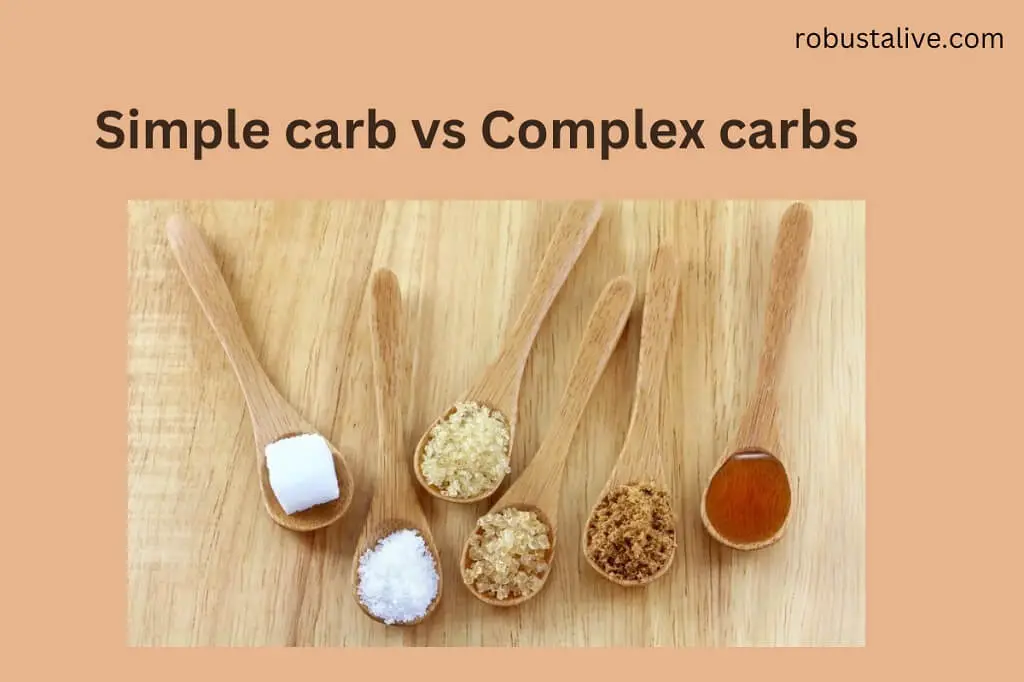Are Carbohydrates Sugar? Know The Details

Are Carbohydrates Sugar? Carbohydrates are one of the vital micronutrients that are found in specific drinks and foods. They include fiber, starches, and sugars. Other micronutrients also contain protein and fat. Your body needs these micronutrients to keep you fit and healthy.
Carbohydrates are mostly made up of sugar. Their name is derived from their chemical composition. It consists of carbon, hydrogen, and oxygen and is collectively called a carbohydrate. Generally, the sugar chain length that makes the carbohydrate determines the digestion and absorption rate.
Since ages, different populations have had entirely different amounts of carbohydrates according to their geography and climate. It also affects the accessibility to micronutrients. The local cuisines must include vegetables, nuts, and legumes in the historic eating patterns.
Whereas; the tribes in the arctic region have traditionally high protein and high-fat diets. Because in the frozen area, it was challenging to forage and grow plant-based foods. Unfortunately, now days processed and refined dietary carbohydrates are very common, which is the main reason for health decline.
There are two main types of carbohydrates

Graphics Credit: Robustalive.com
1. Simple carbohydrates
Simple carbohydrates are simple sugar that includes glucose, lactose, and fructose. It is also found in nutritious whole fruits.
2. Complex carbohydrates
Complex carbohydrates are sugar starches generally found in whole grains, vegetables, bread, rice, and cereals.
Carbohydrates and blood sugar
When you eat the carbs, your digestive system breaks down the simple, digestible sugar that enters the blood.
- As the blood sugar level starts to rise, the pancreas produces the hormone insulin. It prompts the cells to absorb the sugar present in the blood for storage and energy.
- The bloodstream levels begin to fall as the blood starts absorbing the sugar.
- When this happens, the pancreas produces glycogen that signals the liver to release more sugar.
- This interplay between glycogen and insulin ensures that cells throughout the body, especially in our brain, have a steady blood sugar supply.
- The metabolism of carbohydrates is a crucial part of type 2 diabetes. It occurs when our body doesn’t produce the needed amount of insulin or our body doesn’t use the amount it has.
- Type 2 diabetes slowly develops over many years. It starts when our body cells stop responding to insulin. It is generally known as insulin resistance, as the insulin and blood sugar level stays high even long after eating. With time as the insulin demands start increasing, the insulin-producing cells wear off, and insulin production stops.
What are simple carbs?
Simple carbs are made up of simple yet easy-to-digest sugars. Some of them are the natural sugars generally found in the foods like fruits (glucose, fructose) and milk (lactose). However, some other carbs like sucrose (table sugar) are refined and processed and are added to foods like cakes and breakfast cereals.
The simple carbs work in raising the blood sugar level faster as they easily convert into glucose. The simple carbs include:
- Dairy products
- Fruits
- Fruits juices
- Breakfast cereals
- Sugar-sweetened beverages
- Most baked goods
Note that all the foods with simple carbs don’t equally raise your blood glucose level as the fruits have fiber that will slowly absorb in the body and cause a slow rise in the blood glucose level as compared to the soda or sweet drinks with added sugars.
What are complex carbohydrates?
Complex carbs take longer to break down into simple sugar as they are made of long chains. Since complex carbs can cause a gradual rise in blood sugar, they are the perfect choice to balance your blood sugar level. Complex starches include fiber and are generally found in processed and whole foods.
Some complex carbs foods are:
- Quinoa
- Whole grains like oatmeal, barley, brown rice, faro
- Legumes/ beans like lentils and chickpeas
- Non-starchy vegetables like kale and zucchini
- Starchy vegetables like corn and sweet potato
Many foods contain complex carbs and some vital nutrients like minerals and vitamins. However, fiber has no nutritional value but plays a crucial role in maintaining the healthy bacteria in our large intestines. It promotes regular bowel functioning and, in some cases, lowers cholesterol levels.
Remember that complex carb can be any starches like the refined sugar in some foods. Refined starches like white rice and white flour easily break down compared to unprocessed starches and can cause a fast rise in blood glucose.
It’s better to avoid foods that have refined starches as they are usually low in nutrients but high in sugar. Some examples include:
- Sweetened cereals
- Bagels
- White bread
- Baked goods like cookies, doughnuts, and cakes
Are Some Carbohydrates bad?
Carbohydrates have taken a lot of attention in recent years. According to health experts eating more than average refined carbs like soda, candies, white flour, white rice, and other refined grains in bread and pasta can harm health. It also is the primary reason behind the rising obesity issue in the United States.
I wondered; how food could result in such a big issue. Refined and sugar are readily available foods that taste good and come in large portions but don’t fill you up. So it results in eating more than the body needs. Besides, some carbs like sodas and candies are not needed by the body as they don’t have any nutrients.
But this doesn’t mean that all simple sugar are harmful to health. Simple carbs are also present in many nutritious fruits like dairy products, vegetables, and fruits. It provides all the essential nutrients and vitamins needed to maintain overall health and support growth. For example, fresh fruits have simple carbs, essential vitamins, and fiber.
Why is the complex carbs a healthier option?
According to the 2015 to 2020 Americans Dietary Guideline, eating grains is healthy; at least half of them should be made of complex carbs. Whole grains like oatmeal, brown rice, whole grains, cereals, and whole grain bread are all healthy options. A diet rich in whole grains protects against diseases like heart issues and diabetes.
Besides the complex carbs:
- Rich in fiber: Fiber-rich foods are filling and benefit in discouraging you from overeating. Besides, when combined with other fluids, they aid in moving food to move throughout the digestive system and prevent constipation. It also protects you from certain gut cancers.
- Slow breakdown: In the whole grains, all three essential grain parts (bran, germ, and endosperm) are present. At the same time, the reined grains are the endosperm. The whole gives more for the breakdown, making digestion slower. When carbs slowly enter the body, it will be easier to regulate them.
- Provide minerals and vitamins: Whole grains have vital minerals and vitamins like magnesium, iron, and vitamins.
Most school kids should have four to six ounces from the grain group daily. Besides, half of this should include whole grains. An ounce is like one bread slice or 1 cup of ready-to-eat cereal, cooked pasta, or a half cup of cooked rice or hot cereal.
Is a low or no-carb diet healthy?
Some people follow no-carb diets to benefit their weight loss. The most popular low-carb diet includes the ketogenic diet and the Atkins diet. According to the experts, the keto diet is healthy for people with epilepsy and other specific medical conditions.
Strict dietary changes take time to follow in the long term. Some low-carb diets consist of a large number of animal oils and fat. These foods can impact your body by increasing the risk of heart disease. Experts are still determining if a no-carb diet is a healthy option, as it depends on your body’s condition. Consult your doctor before making any decision about dietary changes.
How to find the healthy carbs option?
It can be challenging to distinguish between healthy and unhealthy carbs. But the nutrition facts on your food labels can be helpful. To figure out the carbohydrates look for the three numbers:
- Total carbs: It’s usually listed in grams and combines several different carbohydrate types like sugar, dietary fibers, and other carbs.
- Dietary fiber: It is usually under the total carbohydrates. Dietary fiber has no calories, and a diet rich in fiber has many potential health benefits.
- Sugars: Listed below the total carbohydrates, the nutrition facts label usually doesn’t distinguish between added sugars and natural sugars. The candies, soft drinks, and snacks are full of added sugars. To check if the product has added sugar, search for the words like sugar, fructose, molasses, honey, dextrose, or sweeteners in the ingredient list. Avoid products with high sugar and sweeteners amount.
Though there are only four calories in a gram of carbohydrate, the high sugar in the food means the calories are quickly adding up. Besides, these are empty calories with little to no nutritional value.
Conclusion
Are carbohydrates sugar? Yes, sugar is a carb. Carbs are made up of simple sugar or complex starches like rice and potatoes and fuel the muscles, organs, and brain. The main difference is the chemical structure and how quickly it digests.
Sugars are categorized as monosaccharides, which means simple sugar like glucose and fructose, and complex sugars like disaccharides like a rose. Complex carbs are also polysaccharides, like starches made up of saccharide chains. They have three or more linked chains in their structure, so they take longer to break.
Health professionals also recommend including more carbs (complex) in your daily diet.
FAQs about Are Carbohydrates Sugar?
Are carbohydrates sugar?
Carbs are the macronutrient and the primary energy source, like fats and proteins. They include sugar, starches, and fiber. For the most part, starches and fibers are complex carbohydrates, while sugar makes the more straightforward carbs.
Do carbs turn into fat or sugar?
In a healthy body, carbs will turn into blood glucose to provide energy. But if your blood glucose level gets too low or high, it can be a sign that your body is having trouble producing the required amount of insulin to stay healthy, which eventually results in diabetes.
What happens when you stop eating sugar?
Once you stop eating sugar, you will be at a lower risk of heart disease as you can manage your weight, diabetes, and blood pressure. All of these were the major factors in cardiovascular and heart diseases.
Are carbohydrates sugars or not?
Carbohydrates are the most fundamental part of our daily diet and provide our body with the energy to run. Though sugar joins to make up carbs but remembers they also have other nutrients. Carbohydrates can have different vitamins, minerals, and nutrients, depending on their origin source.
Is it healthy to completely cut off sugar?
You can leave the added sugar from your life to stay healthy. Experts and health organizations have their recommendations, but they all agree on limiting sugar intake. Still, you can have some sugar, and you will remain healthy as before.
References
https://my.clevelandclinic.org/health/articles/15416-carbohydrates
https://kidshealth.org/en/parents/sugar.html
https://medlineplus.gov/carbohydrates.html
https://www.goodrx.com/well-being/diet-nutrition/not-all-carbs-are-the-same





